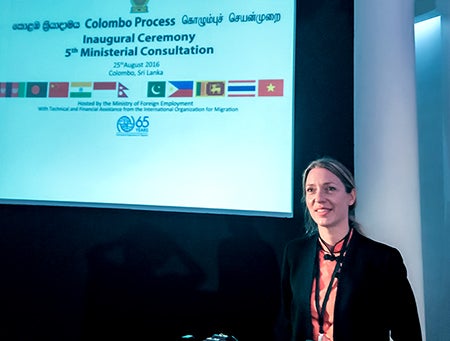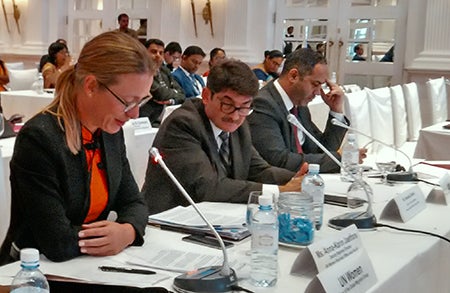Statement for 5th Ministerial Consultation of the Colombo Process by Anna-Karin Jatfors, UN Women Deputy Regional Director
Date:
5th Ministerial Consultation of the Colombo Process
Statement from UN Women, 2016 Chair of the Global Migration Group
Colombo (Sri Lanka), 25 August 2016
![[GMG Logo]](/sites/default/files/Field%20Office%20ESEAsia/Images/2016/08/GMG-logo-400px.jpg?la=en)
Your Excellency, Hon. Thalatha Athukorala, Minister of Foreign Employment of the Government of Sri Lanka, Chair in Office of the Colombo Process, H.E. William Lacy Swing, Director General, International Organization for Migration,Distinguished delegates from Colombo Process Member states, Representatives from the Abu Dhabi Dialogue (ADD), the Swiss Development Cooperation (SDC), ILO, Civil society organisations and observers of the Colombo Process,Ladies and gentlemen.

On behalf of UN Women and the Global Migration Group, I would like to start by thanking the Ministry of Foreign Employment of Sri Lanka and the Colombo Process Secretariat for your kind invitation. It is my honour to be here with you today to deliver a statement, in our role as the chair of the Global Migration Group (GMG) in 2016.
The GMG is an inter-agency group which brings together 17 UN entities and the International Organization for Migration (soon to become a member of the UN system) to encourage the adoption of coherent, comprehensive and coordinated approaches to the issue of international migration. This year, UN Women is undertaking the important role of chairing this group, with three main objectives:
- First, ensuring that both men and women migrants are impacted positively by the work of the GMG, and elevating the focus on women in the migration debate.
- Second, strengthening the role of the GMG, its members and their partners, in particular the Global Forum on Migration and Development (GFMD), in the implementation and monitoring of the migration-related targets and indicators of the 2030 Agenda for Sustainable Development.
- Third, strengthening the GMG’s effectiveness and impact, through increased coordination and cooperation.
I would like to share a few reflections on how the rights of migrants, especially women and girls, can be advanced through our collective action.
The Colombo Process has identified five thematic areas to guide its work: skills and qualification recognition, fostering ethical recruitment, pre-departure orientation and empowerment, remittances, and labour market analysis. They reflect the complex and often unpredictable global trends of labour mobility in the twenty-first century, especially here in Asia. They all speak to the broader debates on how we can best organize and support human aspirations and labour market dynamics.
First, with regards to the recognition of skills and qualifications: Even when women and men obtain skills before leaving a certain country, migration can mean accepting jobs where these skills are under-utilized. Both receiving and sending countries, as well as migrants themselves, would benefit from recognition of skills, through certification and accreditation both in countries of origin and destination.
Multilateral and regional trade negotiations can serve as an important platform to facilitate mobility by supporting mutual recognition agreements that recognize qualifications granted in one country as valid in another; by streamlining recruitment criteria; and in setting common international standards. As such, they are an important means of implementation for the SDGs.
Second, on the issue of pre-departure orientation: Migration should always be a matter of choice rather than a necessity, and that choice should be based on factual information and realistic expectations. In this regard, pre-departure orientation often plays an important role in shaping and influencing migrants’ decisions. To serve as an effective protection tool for migrants, such orientation needs to be relevant, comprehensive, comparable, and accessible by all, especially women migrant workers. The Comprehensive Information Orientation Programme that is being supported under the Colombo Process is an important initiative in this respect, and we support such endeavours.

Similarly, under the Abu Dhabi Dialogue, the UAE-led pilot project on skill development, certification and recognition - being implemented in partnership with UAE employers as well as training centres based in India, Pakistan and Sri Lanka - is a promising development. We hope that such pilot initiatives can be explored for other work sectors as well, especially the ones where women are largely represented.
Third, on fostering ethical recruitment and empowerment of migrant workers: While labour migration can be an empowering experience for women if their rights are respected, the journey is not always as positive. This is especially true for women in domestic and care work, a sector which is still largely under-valued and poorly regulated. In line with the SDGs, we call on policy makers to protect labour rights and promote safe working conditions of all workers, particularly women migrants (SDG target 8.8), and to develop and implement policies to facilitate safe, orderly and regular migration (SDG target 10.7). In addition, potential migrants need access to information and increased awareness of the risks of informal recruitment and human trafficking. The drive by the Colombo Process to promote and protect women migrant workers is a welcome one in achieving these targets.
We are pleased that the Colombo Process has recognized that the lack of standard terms of employment, and limitations with respect to their enforceability, constitute major challenges in protecting and promoting the rights of migrant workers, especially women migrant workers. UN Women is drafting a standardized gender-responsive employment contract for migrant women domestic workers that will be ready by September 2016. Distinguished delegates, we would like all of you to take this agenda forward, not only within the Colombo Process, but also through the Abu Dhabi Dialogue, the ASEAN Forum on Migrant Labour, the Global Forum on Migration and Development, and other fora.
Fourth, on the issue of remittances: We know that origin countries benefit tremendously from the economic and social remittances of migrants, including the saved earnings sent home to sustain households; and the transfer of skills, knowledge and technology to communities at home. An important area for policy intervention is to reduce the transaction costs associated with remittances in both countries of origin and destination - as established in SDG Target 10.c.
Key barriers to the effective flow of remittances include the often limited availability of remittances-related services offered by banks, as well as obstacles to the work of non-bank remittance service providers. Reducing these barriers can also have a strong positive impact on women’s access to financial markets and support their economic empowerment. To work for women, remittance transfer mechanisms and savings and investment schemes need to be gender-responsive, so that they enable women migrants to transfer funds and to save for themselves and for when they retire.
Fifth, on the issue of labour market analysis: The GMG underlines the importance of achieving target 17.18 of the 2030 Agenda for Sustainable Development, which calls for supporting capacity building to developing countries to significantly increase the availability of high-quality, timely and reliable data that is disaggregated, among other things, by sex, age and migratory status. Disaggregated data is a necessary precondition for evidence-based gender-responsive migration policies.
More broadly, we know that when women migrate, this often results in shifts in power dynamics and gender relations within both households and communities. These changes are often complex and non-linear. Women who migrate may gain power in some aspects of their lives, but also face specific and deeply gendered vulnerabilities. This includes discrimination and increased risk of violence and exploitation, which may occur from the time they decide to migrate to the moment they are back at home with their families. This is why all steps in the migration cycle need to respond to the specific needs of both women and men migrants in different sectors – including those in the global care chain. To spearhead gender equality in labour migration, we also need to recognize and value the contributions of women migrant workers, including women migrant domestic workers, towards sustainable development.
I want to end by thanking the Government of Sri Lanka, other governments, and the Colombo Process Secretariat, for your initiative, commitment and partnership to tackle the different dimensions of migration through this dynamic and collaborative platform. We commend the role that the Colombo Process has played in setting ground-breaking international labour migration standards, such as working towards zero recruitment fees, and we are encouraged by what you have discussed and agreed upon in the last two days. Your decisions will impact millions of people who are working abroad to improve their livelihoods, to seek decent work and to pursue new opportunities, and to create a better life for themselves and their families.
Let us take advantage of this process to learn from each other and seek guidance from both countries of origin and destination, to promote the human rights of all migrants, to provide a platform for them to voice their needs, and to contribute to decisions that positively impact their lives.
The GMG stands ready to support you to make migration a positive experience for all men and women on the move, for their families, and for communities of origin and destination.
Thank you very much.